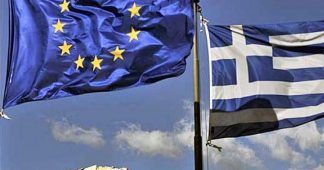Details of the bailout agreement with Greece are being examined around the world. The against-time clauses requiring the Greek prime minister to have the conditions approved by parliament to save default after having enjoined the electorate to vote ‘No’ in the referendum, assumed elements of an action thriller .The Greek public had obliged by voting ‘No’, forcing him to eat crow- first while negotiating with the bailiffs in Brussels and then coming back and telling his party to do an about turn.
Once the deal was done the reactions around the world were largely positive; in Europe they heaved a sigh of relief that the Union and Euro would live to fight another day. Markets around the world reacted positively. In Greece itself the mood was somber. Undergoing considerable pain, more pain was in store. The following figures from published reports reveal the extent of disaster that had overtaken the tiny nation: “five years of austerity in Greece has seen pensions and wages slashed, while unemployment has risen to 26 per cent, with youth unemployment soaring to nearly 50 per cent. The number of Greeks at risk of poverty more than doubled between 2008 and 2013 to over 44 per cent”.
The real worry for the decision-makers in Brussels and Berlin should not be as to whether there could be a further default. The bigger worry should relate to aspects that have not really figured in the analyses following the collective sigh of relief that the Union and the Euro were intact. These relate to Security and the fate that could befall the Cradle of European civilization. Both require elaboration.
Taking security first, Greece remains an important member of NATO. Its ability to fulfill its mission to guard NATO’s flank stands vastly impaired. Greece has thousands of islands in the seas surrounding it; of these only a few hundred are inhabited. Surveillance of the remaining islands was already cursory. With further budgetary cuts even the pretence of surveillance over large tracts of its maritime domain will disappear with far-reaching security consequences.
Greece ’s current population would be around 11 million. It is estimated that now nearly 10 per cent of the population comprises immigrants – from neighbouring East European countries and a far larger percentage from Asia, mainly South Asia. Among the latter the Pakistanis form the majority, their entry into Greece having been facilitated over several decades by Turkey owing to its close relations with Pakistan , being erstwhile fellow-members along with Iran of the CENTO Pact during the Cold War. The non-European immigrants, mostly illegal, have been coming to Greece with the aim of moving on to other parts of Europe . The majority remain stuck in Greece . With its small indigenous population the ratio of immigrants is already very high. Added to this are the reports coming in that not finding jobs and reduced to utter destitution many young Greeks, including those with high educational qualifications are leaving Greek shores for greener pastures. Over a period of time, should the trend continue, the ratio of outsiders-to-insiders could have dangerous security implications; what with the whole of Europe being swamped with large numbers of boat people from North Africa and the fighting in Iraq, Syria and Libya dashing themselves daily against European shores. It is now feared that a number of the incoming boat people might be ISIS agents. In the case of Greece large number of uninhabited Greek islands could become permanent bases for pushing in people, awaiting further opportunity to get into Greece , and thence to the rest of Europe . Recently there were reports of ISIS setting up a permanent base on the European mainland.
Coming on to the civilisational aspect, the European nations should be horrified at what is happening on the ground to their cradle of civilization. Even before the most recent bailout foreigners were snapping up property. The most important acquisition was the Chinese lease of terminals in the port of Piraeus . With sales of property mandated by the latest package for sell-off of assets to raise 50 billion euros, it becomes more than likely that the Chinese could be planning to take over the entire port. As it is, distress sale of private properties had been taking place. The speed of foreign acquisitions of private properties is picking up, largely by Russians and Chinese going by current reports. However, there may be other people who might not fall in the desirable category that might be buying properties through proxies, including banks, many of which have been bailed out by mafia and drug deposits.
The net result in the coming years would be that Europeans looking for their roots as well as tourists coming to Greece to delight in ancient Greek history, architecture and culture would be horrified to find non-Greeks showing them around the Acropolis and the Athens museums, not to mention historic villas that had belonged to erstwhile shipping magnates and the Greek super rich. Should the trend continue the biggest disaster that looms is the possibility of the non-Greeks populating Greece in much larger numbers due to falling birth rates among the Greeks and the exodus of young Greeks due to poverty and lack of employment. It is a frightening scenario when looking at the larger picture of the differential growth rates among the native Europeans when compared to the largely incoming denomination whose birth rate is already a multiple of 3, 4 or 5 when compared to the Europeans. In the case of Greece, after 50 years or so there would not be too many Greeks left to hold up the European and NATO-end of the Old Continent that had spread out to rule the world over the earlier centuries. An historic reversal or a monumental blunder!
New Delhi – July 20, 2015
—————-
* The author was a keynote presenter at the Hellenic MoD Colloquium at Athens on September 30, 2009. He is an analyst of global trends.










